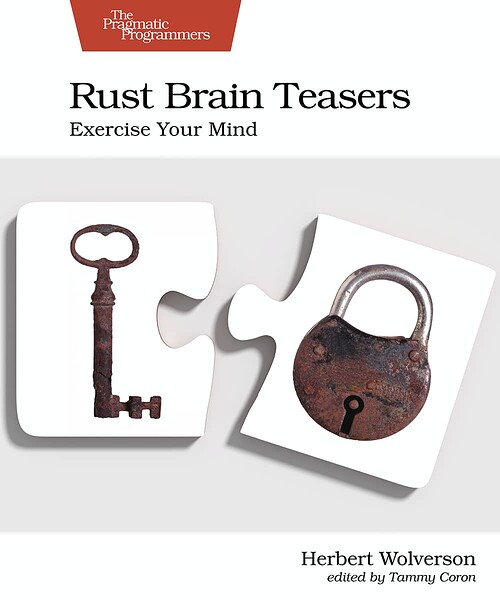Rust Brain Teasers (Pragmatic Bookshelf)
PragmaticBookshelf
Herbert Wolverson @herbert
Tammy Coron @Paradox927
The Rust programming language is consistent and does its best to avoid surprising the programmer. Like all languages, though, Rust still has its quirks. But these quirks present a teaching opportunity. In this book, you’ll work through a series of brain teasers that will challenge your understanding of Rust. By understanding the gaps in your knowledge, you can become better at what you do and avoid mistakes. Many of the teasers in this book come from the author’s own experience creating software. Others derive from commonly asked questions in the Rust community. Regardless of their origin, these brain teasers are fun, and let’s face it: who doesn’t love a good puzzle, right?
What better way to exercise your brain and increase your Rust programming knowledge than with a collection of dynamic brain teasers? As you read through each of these puzzles and try to work out the answers, you’ll not only learn about Rust’s unique quirks and peculiarities, you’ll also have loads of fun along the way.
Dive right in and get started with example code and sample problems that cover numbers and text, shadowing and memory, and everything in between. Try to figure out why a particular program won’t compile, why it produces unexpected output, or why it panics and terminates with an error message. Once you’ve run the code and read the answer, it’s time to get to the heart of the matter with a detailed explanation. Learn why a program produced the result it did, and discover how similar issues might affect the code you write in your own programs, even in production. Sourced from engaging discussions within the Rust community, real-world problems, and even reader feedback, these challenges will certainly surprise, enlighten, and entertain you.
Are you ready to experience Rust like never before? Then sharpen your brain and get ready for a challenge!
Herbert Wolverson author of Hands-on Rust, has worked as a programmer and indie game developer since the late 1990s. He’s taught programming and IT skills at a variety of levels, contributes to multiple open source projects, and is active in the game development scene.
- Full details: Rust Brain Teasers: Exercise Your Mind by Herbert Wolverson
- View this book’s portal and details on how to post errata and suggestions here.
Don’t forget you can get 35% off with your Devtalk discount! Just use the coupon code “devtalk.com" at checkout ![]()
Latest Threads About This Book

Most Active This Week

Most Active This Month

Most Active This Year

Most Active Last Three Years

Most Active Over Three Years

Latest in Rust Brain Teasers
Get money off!

The Pragmatic Bookshelf
35% off any eBook
Use the coupon code "devtalk.com" to get 35% off any eBook published by PragProg!










